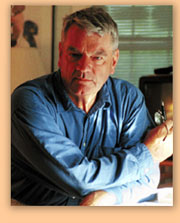Dear Mr. McLachlan,Confirming the conclusions reached during our talk
yesterday evening, I have told Mr. Kimber what we
discussed, and he agrees that
- I should send you (through him) some samples
of the material in 'The Virus House" -- the book about
our Intelligence attack on the wartime German atomic
research programme; and
- I should also let you have through Mr. Kimber
a sample chapter of "Disaster Convoy PQ.17", which is
at present with my lawyers.
Book 1 is, I believe, scheduled for publication
this coming Spring. Book 2 is probably coming out during
the following Autumn. The sample "PQ.17" chapter will
probably be the one describing how the Admiralty reached
their fateful decisions on 4th July 1942.
On the subject of "PQ.17", I must say how sorry I
am that after all these years my clash with Lord Justice
W. still rankles. As it seems to be in danger of
oppressing our future relations, I have looked up my
dusty files on the "PQ.17" research project, and I think
I should privately tell you exactly what
happened:
I interviewed or corresponded with 250 -300
survivors of PQ.17, and suffered only one rejection: a
Newcastle ship's Master -- who had abandoned ship leaving
a naval party to founder aboard her -- initially refused
my advance application for an interview. By April 1963, I
had somehow learned (I believe from Vice-Admiral D.) that
W.'s was a key role in the story; it was vital, said D.,
to interview him. Now, as an unknown author I could
either write in for an interview and risk a point- blank,
and irreversible, refusal (highly probable from W., in
view of my subject); or I could arrive diplomatically on
his Belgravia doorstep and ask in person whether an
interview could be arranged in the near future. The
latter approach had invariably worked without friction
before -- for example Vice-Admiral D., whom I interviewed
several times during that March, has never to my
knowledge found my manner offensive. I accordingly humbly
pressed W.'s doorbell at 8:55 pm on 2nd April 1963, and
W. forthwith invited me into his drawing -- room; he did
not mention either then or at any other time that this
was an inconvenient hour. I discussed with him his
general PQ.17 recollections -- he was hesitant rather
than forthcoming -- until 9:20 pm., when I retired to a
local restaurant to write the aide mémoire which
now faces me on my file. So far so good; I anticipated
that having established what seemed to me a normal and
cordial relationship personally with W., I might press my
more cogent questions upon him at a later instance.
Unfortunately W. seemed to have anticipated the same
sequel, for when I telephoned his home at 9:25 p.m. five
nights later, solely to ascertain the correct wartime
designation of his office, he rudely hung up within less
than three minutes.
For me his unexpected rudeness was a
turning-point.
I had made a detailed transcript of the
conversation in my Telephone Log, which again confronts
me now. It seemed to me that, excellent Intelligence
officer that W. was, he would not communicate any further
information to me unless I could contrive to penetrate
the barrier he had now thrown up. I now realise how wrong
this was of me, but at the time I considered that his (to
me) unmannerly behaviour justified further drastic
action:
I mailed to him
a graphic transcript of his language the previous night,
and said that none of the scores of naval officers I had
had the pleasure of interviewing had treated me as
discourteously as he. I hoped that he would lose
sufficient of his self-composure in his reply to counter
the information I imparted in my covering letter to him,
and indeed in his outraged three-page reply to me he
involuntarily gave me in one sentence, which I hope was
genuine, the very information I needed* to confirm what
the officers on his staff, of whom I had already
interviewed some six or seven, had told me. I did not
need to bother him further.
Three years after this ungentlemanly exchange, I
realise, for my part, how unbecoming my methods were. The
extraction of Intelligence has never been a gentlemanly
pursuit, and when essaying to obtain facts from an
officer of such outstanding Intelligence training as W.,
one is compelled -- once other approaches have failed --
to adopt a more unorthodox technique. If there is
anything I could to rehabilitate myself in W.'s esteem, I
would hasten to do so.
Yours faithfully,

(David Irving)
Donald McLachlan, Esq.
Sunday Telegraph,
Fleet Street,
London E.C.4
* The whole passage will be in the "PQ.17"
manuscript which is eventually sent you.

 Captain
J E Broome, DSO, RN, the
escort commander in this 1942 North Russian convoy
disaster, sued David Irving in libel after the
publication by Cassell and Co. Ltd. of this book in
October 1968. The case came to trial in February
1970; after seventeen days the Jury awarded Broome
what was then one of the largest sums of damages,
including punitive damages, in history.
Captain
J E Broome, DSO, RN, the
escort commander in this 1942 North Russian convoy
disaster, sued David Irving in libel after the
publication by Cassell and Co. Ltd. of this book in
October 1968. The case came to trial in February
1970; after seventeen days the Jury awarded Broome
what was then one of the largest sums of damages,
including punitive damages, in history.